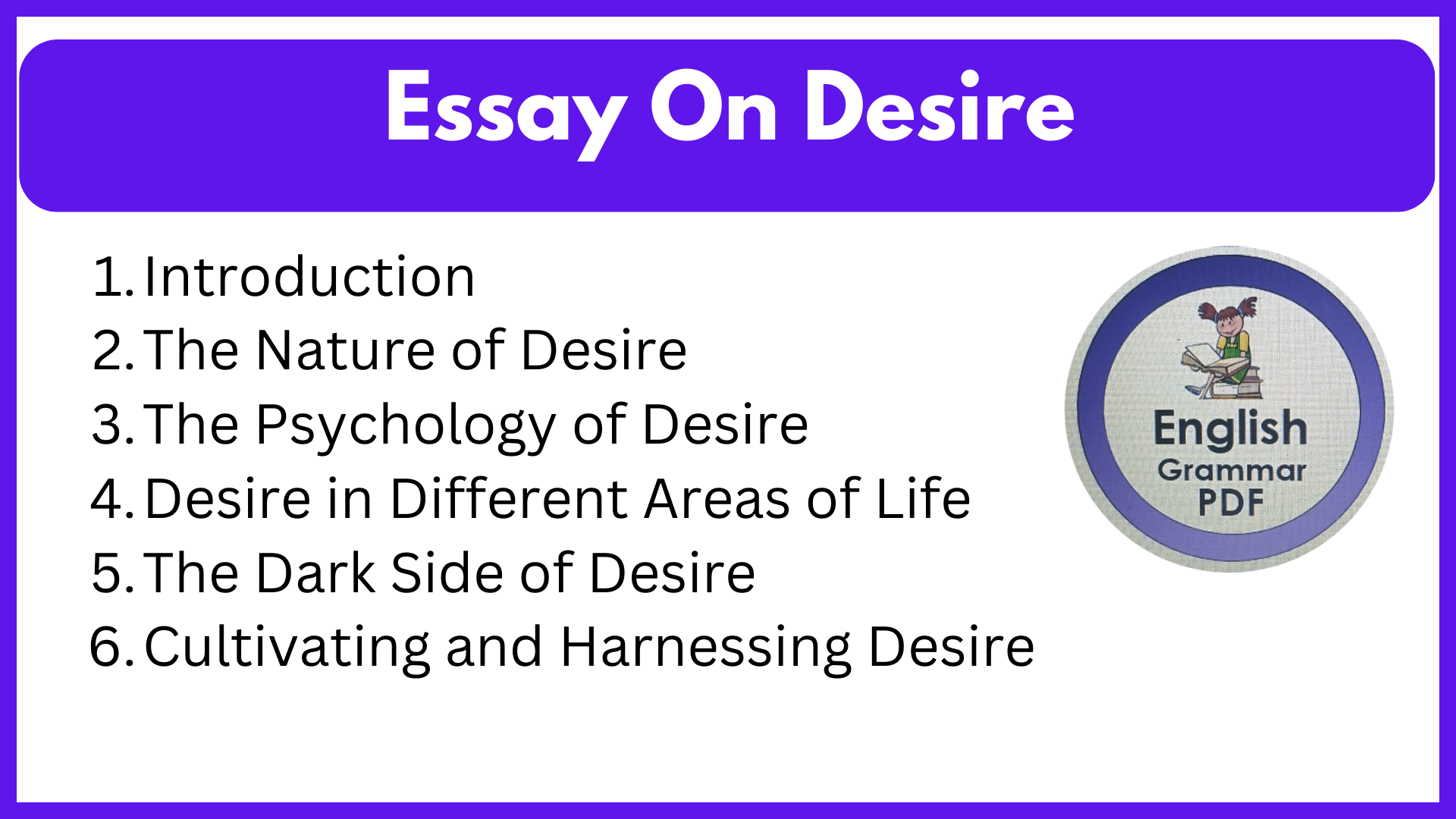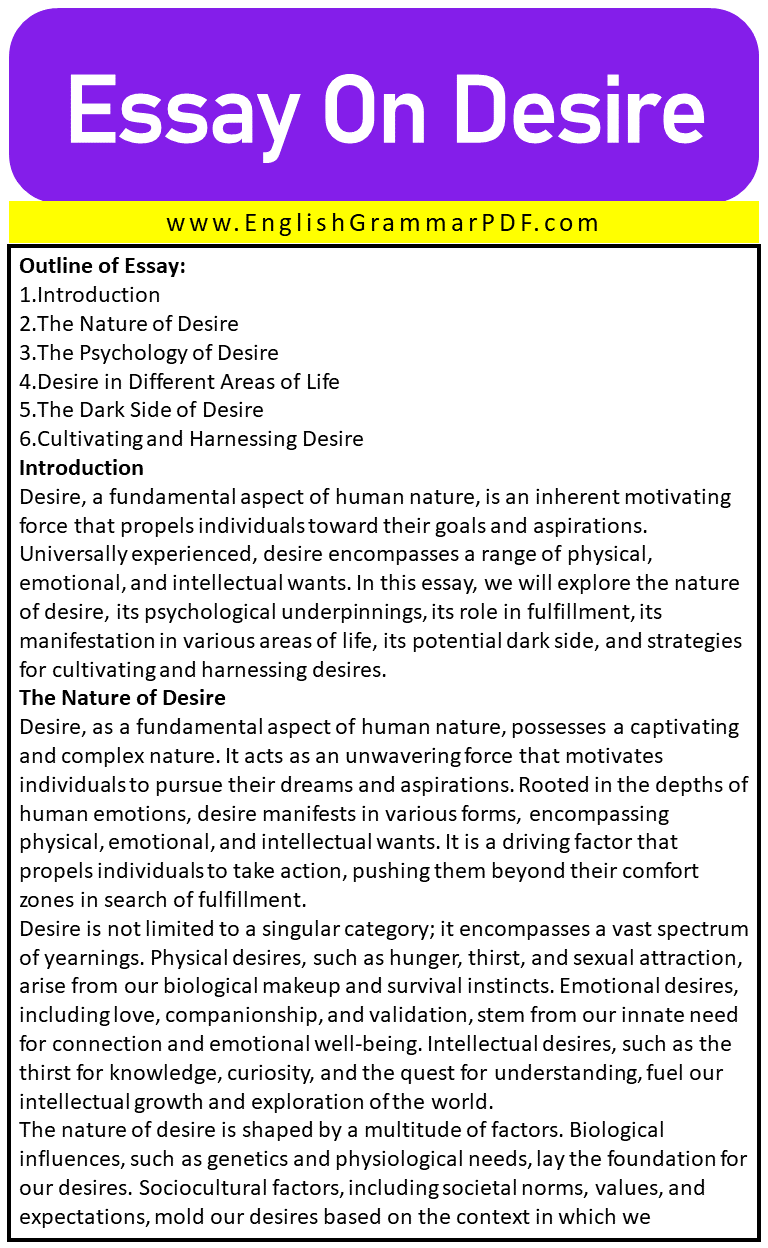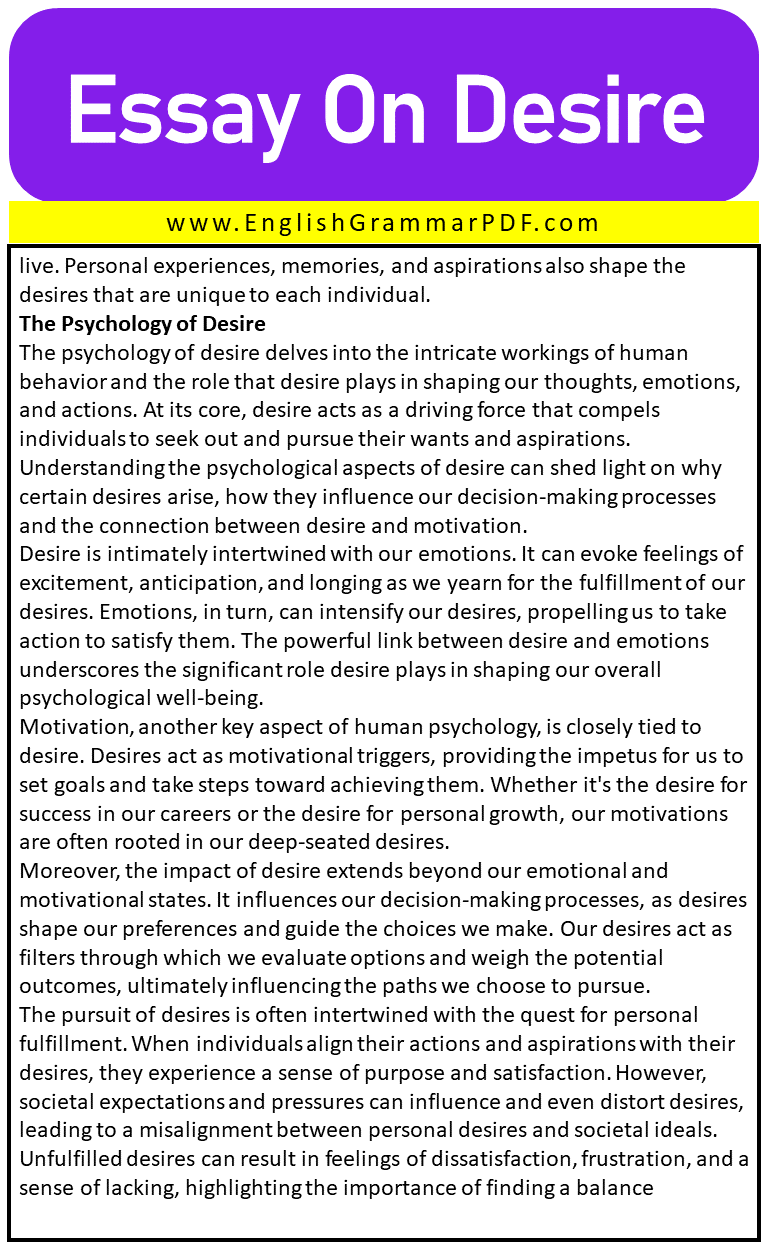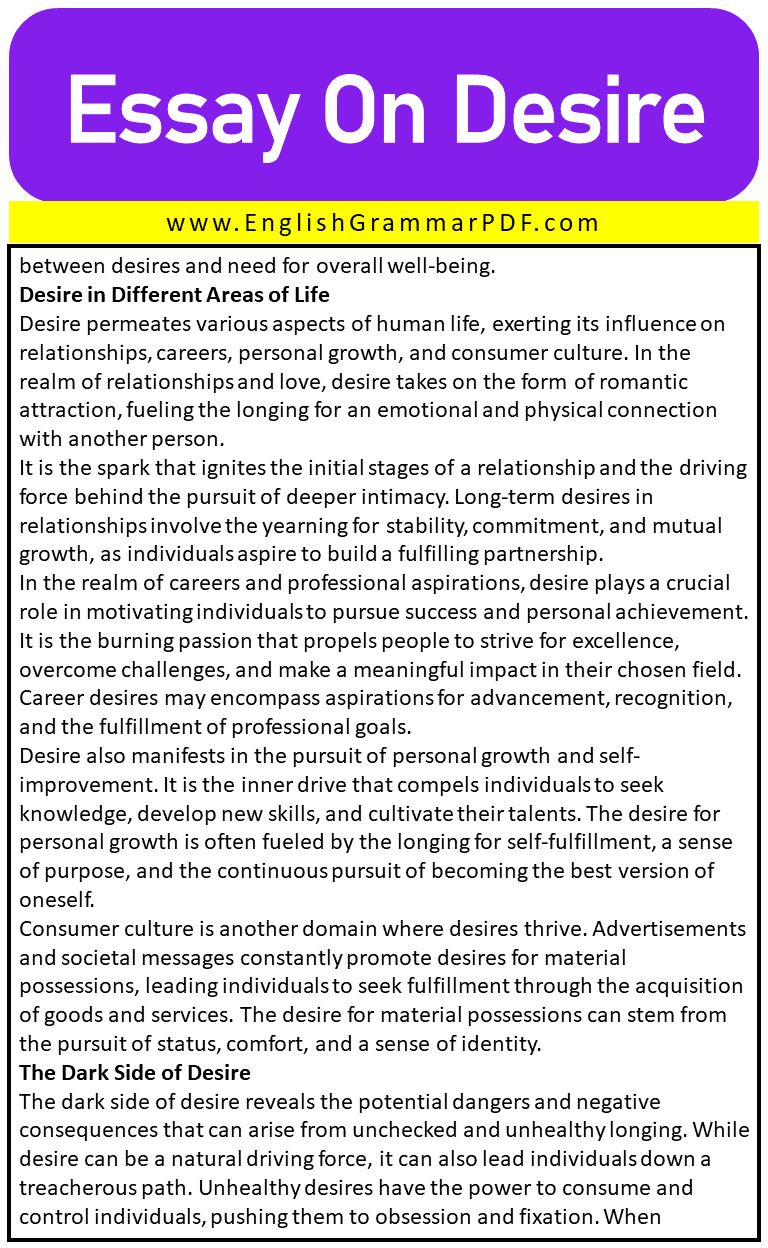Essay On Desire
Outline of Essay:
- Introduction
- The Nature of Desire
- The Psychology of Desire
- Desire in Different Areas of Life
- The Dark Side of Desire
- Cultivating and Harnessing Desire
Introduction
Desire, a fundamental aspect of human nature, is an inherent motivating force that propels individuals toward their goals and aspirations. Universally experienced, desire encompasses a range of physical, emotional, and intellectual wants. In this essay, we will explore the nature of desire, its psychological underpinnings, its role in fulfillment, its manifestation in various areas of life, its potential dark side, and strategies for cultivating and harnessing desires.
The Nature of Desire
Desire, as a fundamental aspect of human nature, possesses a captivating and complex nature. It acts as an unwavering force that motivates individuals to pursue their dreams and aspirations. Rooted in the depths of human emotions, desire manifests in various forms, encompassing physical, emotional, and intellectual wants. It is a driving factor that propels individuals to take action, pushing them beyond their comfort zones in search of fulfillment.
Desire is not limited to a singular category; it encompasses a vast spectrum of yearnings. Physical desires, such as hunger, thirst, and sexual attraction, arise from our biological makeup and survival instincts. Emotional desires, including love, companionship, and validation, stem from our innate need for connection and emotional well-being. Intellectual desires, such as the thirst for knowledge, curiosity, and the quest for understanding, fuel our intellectual growth and exploration of the world.
The nature of desire is shaped by a multitude of factors. Biological influences, such as genetics and physiological needs, lay the foundation for our desires. Sociocultural factors, including societal norms, values, and expectations, mold our desires based on the context in which we live. Personal experiences, memories, and aspirations also shape the desires that are unique to each individual.
The Psychology of Desire
The psychology of desire delves into the intricate workings of human behavior and the role that desire plays in shaping our thoughts, emotions, and actions. At its core, desire acts as a driving force that compels individuals to seek out and pursue their wants and aspirations. Understanding the psychological aspects of desire can shed light on why certain desires arise, how they influence our decision-making processes and the connection between desire and motivation.
Desire is intimately intertwined with our emotions. It can evoke feelings of excitement, anticipation, and longing as we yearn for the fulfillment of our desires. Emotions, in turn, can intensify our desires, propelling us to take action to satisfy them. The powerful link between desire and emotions underscores the significant role desire plays in shaping our overall psychological well-being.
Motivation, another key aspect of human psychology, is closely tied to desire. Desires act as motivational triggers, providing the impetus for us to set goals and take steps toward achieving them. Whether it’s the desire for success in our careers or the desire for personal growth, our motivations are often rooted in our deep-seated desires.
Moreover, the impact of desire extends beyond our emotional and motivational states. It influences our decision-making processes, as desires shape our preferences and guide the choices we make. Our desires act as filters through which we evaluate options and weigh the potential outcomes, ultimately influencing the paths we choose to pursue.
The pursuit of desires is often intertwined with the quest for personal fulfillment. When individuals align their actions and aspirations with their desires, they experience a sense of purpose and satisfaction. However, societal expectations and pressures can influence and even distort desires, leading to a misalignment between personal desires and societal ideals. Unfulfilled desires can result in feelings of dissatisfaction, frustration, and a sense of lacking, highlighting the importance of finding a balance between desires and need for overall well-being.
Desire in Different Areas of Life
Desire permeates various aspects of human life, exerting its influence on relationships, careers, personal growth, and consumer culture. In the realm of relationships and love, desire takes on the form of romantic attraction, fueling the longing for an emotional and physical connection with another person.
It is the spark that ignites the initial stages of a relationship and the driving force behind the pursuit of deeper intimacy. Long-term desires in relationships involve the yearning for stability, commitment, and mutual growth, as individuals aspire to build a fulfilling partnership.
In the realm of careers and professional aspirations, desire plays a crucial role in motivating individuals to pursue success and personal achievement. It is the burning passion that propels people to strive for excellence, overcome challenges, and make a meaningful impact in their chosen field. Career desires may encompass aspirations for advancement, recognition, and the fulfillment of professional goals.
Desire also manifests in the pursuit of personal growth and self-improvement. It is the inner drive that compels individuals to seek knowledge, develop new skills, and cultivate their talents. The desire for personal growth is often fueled by the longing for self-fulfillment, a sense of purpose, and the continuous pursuit of becoming the best version of oneself.
Consumer culture is another domain where desires thrive. Advertisements and societal messages constantly promote desires for material possessions, leading individuals to seek fulfillment through the acquisition of goods and services. The desire for material possessions can stem from the pursuit of status, comfort, and a sense of identity.
The Dark Side of Desire
The dark side of desire reveals the potential dangers and negative consequences that can arise from unchecked and unhealthy longing. While desire can be a natural driving force, it can also lead individuals down a treacherous path. Unhealthy desires have the power to consume and control individuals, pushing them to obsession and fixation. When desire becomes an all-encompassing focus, individuals may prioritize their wants above everything else, disregarding the well-being of themselves and others in the process.
Obsession and unhealthy desires can result in destructive behaviors. Individuals may engage in reckless actions or make harmful choices, blinded by their intense desires. This can lead to detrimental outcomes in various areas of life, including relationships, careers, and personal well-being. Uncontrolled desire can also manifest as addiction, with individuals becoming dependent on certain substances or behaviors to fulfill their cravings.
Managing and redirecting unhealthy desires is crucial for maintaining balance and well-being. This involves self-reflection and awareness to identify when desires become excessive or harmful. By recognizing the negative consequences of unchecked desires, individuals can take steps to address and redirect their longings toward healthier pursuits. Seeking support from friends, family, or professionals can also aid in managing the dark side of desire.
Cultivating and Harnessing Desire
Cultivating and harnessing desire involves the conscious effort to channel and direct our wants and aspirations toward meaningful pursuits. It is about understanding our desires, setting goals, and taking action to achieve them. By actively engaging with our desires, we can find greater satisfaction, fulfillment, and purpose in our lives.
To cultivate desire, it is essential to engage in self-reflection and introspection. This involves examining our values, interests, and motivations to identify what truly drives us. By gaining a deeper understanding of our desires, we can align them with our values and aspirations.
Setting clear and achievable goals is another crucial step in cultivating desire. By defining specific objectives, we provide ourselves with a sense of direction and purpose. These goals act as a roadmap, guiding our actions and decisions toward the fulfillment of our desires.
However, it is not enough to simply cultivate desire; we must also learn to harness it effectively. This involves translating our desires into action and maintaining focus and discipline. It requires perseverance, resilience, and the willingness to overcome obstacles and setbacks along the way.
Harnessing desire also means finding a balance between being driven by our wants and being mindful of our needs. It is about recognizing that desires should enhance our overall well-being and contribute positively to our lives and the lives of those around us.
FAQ’s
What is the importance of desire?
Desire is important as it serves as a motivating force that drives individuals to pursue their goals, dreams, and aspirations, giving them a sense of purpose and direction in life.
What is the most powerful desire?
The most powerful desire can vary from person to person as it is subjective. It can be love, success, knowledge, or even inner peace, as different individuals prioritize and value different desires based on their personal needs and values.
Explore More Essays:
Download the PDF of the Essay:








